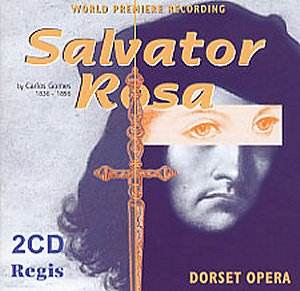There are not many South American composers one could
name at the drop of a hat; Villa-Lobos may be the exception but Gomes
runs a close second, though entirely due to his Aida-style opera
Il Guarany. Though Brazilian he was sent by his enlightened Emperor
(Pedro II) to study in Italy, so the Verdian influence is unsurprising,
and indeed the great man admired him, so it is said. Gomes had made
his Italian debut as a composer of operetta, which may explain why his
music does occasionally descend into rum-ti-tum rhythms.
The duet between Salvator and Masaniello near the start
of Salvator Rosa sounds as if it is going to break into ‘A life
on the ocean wave’ at any moment. The end of Act two, Scene two has
overtones of a Song without Words by Mendelssohn. The trumpet
solo with the offstage chorus in Act four has a familiar ring to it,
while the start of the overture is very like Aida, which, considering
the date of the opera’s premiere (Teatro Carlo Felice, Genoa, 21 March
1874), is understandable. Thereafter it had to wait over a century for
its first British staging, by Dorset Opera, in the summer of 2000. The
opera’s librettist was Antonio Ghislanzoni, Verdi’s collaborator for
La forza del destino and the versifier of Aida.
Salvator Rosa (1615-1673) was born near Naples and
lived his adult life in Rome as a painter, improviser, actor, and poet.
As a patriot he made powerful enemies with his satires. He wisely moved
to Florence for the 1640s before returning to Rome when the dust had
settled. He is remembered for his paintings of wild and savage landscape
scenes. The opera is much concerned with his patriotism, plots and insurrection
(no shortage of ‘Viva la libertà’), power struggles, and misunderstood
love, with the usual pot-pourri of assassins, brigands, aristocrats,
nuns and a self-sacrificing soprano who, committing suicide in public
to avoid a forced marriage, urges her lover to live on and paint. The
music has some glorious moments as well as lesser ones of paper-thin
quality. The duets are Gomes’s most inspired creations, though when
the harp is in full cry with the singers the music is invariably thrilling.
Despite the absence of any audience applause, the CD
is an amalgam of two live stagings at Dorset Opera’s base at Sherborne
School (the give-away some choral clapping and foot-stamping to a rustic
Tarantella - evoking Verdi’s Forza del destino - at the end of
Act two), and there are a few strange vocal balances especially with
the amateur chorus with one or two individual voices from their 48-strong
group occasionally over-audible. They are not helped by some curious
writing and miscalculations on Gomes’s part, such as the taxing men's
chorus with accompanying bassoon. The convent scene has the obligatory
bell and (hideous electronic) organ to accompany the sisters, who, when
in a more upbeat interlude, threaten to kick the habit and get ahead
of the beat.
It’s a pity there’s no biographical information in
the booklet about the international line-up of soloists (this reviewer
managed to get hold of a programme issued at the performances) because
some of the singing is very good, particularly Lisa Livingston’s dramatically
vivid Isabella (a glorious, effortless top C to end Act two and darker
Verdian colours in her Act three Romanza). Bulgarian Michail Milanov’s
imposing bass (and not a tenor as listed on the box) sings the Viceroy.
Success is rather patchy for the occasional woolly, unfocused tenor
of the opera’s hero. Del Valle’s voice might be an acquired taste for
some, (and one reviewer of his Wexford appearance in Gomes’s opera Fosca
brought the names of Domingo, Caruso, Bergonzi, and Gigli into the frame)
but to this writer, though the voice has satisfying, even thrilling,
moments it is inconsistent and frequently sounds as if it’s all too
much of an effort. The top notes produced by this Hungarian-Spanish
tenor have that uneasy feeling of being just under the note, (although
in that regard some other cast members are not exactly guiltless). By
the end, Mario Lanza-style sobs begin to creep in. The Australian baritone
Michael Glucksmann (one of several of this almost entirely non-British
cast making a return appearance with the company) tends to bark when
his role becomes more agitated and only just clings on to his long sustained
high notes (Fs and a G) during Masaniello’s acclamation scene. On the
other hand Andrea Baker’s gutsy Gennariello (the trouser-role of Rosa’s
apprentice) packs a punch, her harp-accompanied serenade at the start
of the fourth act stylishly delivered including her final B flat.
The orchestra of 42, led by former Hallé leader,
Pan Hon Lee and including such luminaries as former BBC Symphony Orchestra
clarinettist Colin Bradbury (has he retired to leafy Dorset perhaps?)
are presumably largely players from the nearest professional band, the
Bournemouth Symphony Orchestra on a busman’s holiday. They are in fine
fettle under Patrick Shelley, who has lovingly edited the score and
clearly enjoys this piece.
The high point of 19th Italian opera is
so often the second act finale with its processionals, offstage bands
and always enthusiastic chorus of onlooking townsfolk. Unsurprisingly
it duly gets a full-blown, climactic delivery though not without some
rough edges in ensemble and balance. Considering it’s the only disc
available, one can put up with such shortcomings and thank Dorset Opera
for their enterprise, first in staging it and now in producing the CD.
And by the way, if you want to see a self-portrait
of Salvator Rosa, he is in Room 32 at the National Gallery in London.
The inscription on the paper he is holding reads in effect, ‘Shut up
unless you have something worthwhile to say’. Perhaps, in view of Gomes’
opera, it should have been ‘sing’?
Christopher Fifield


